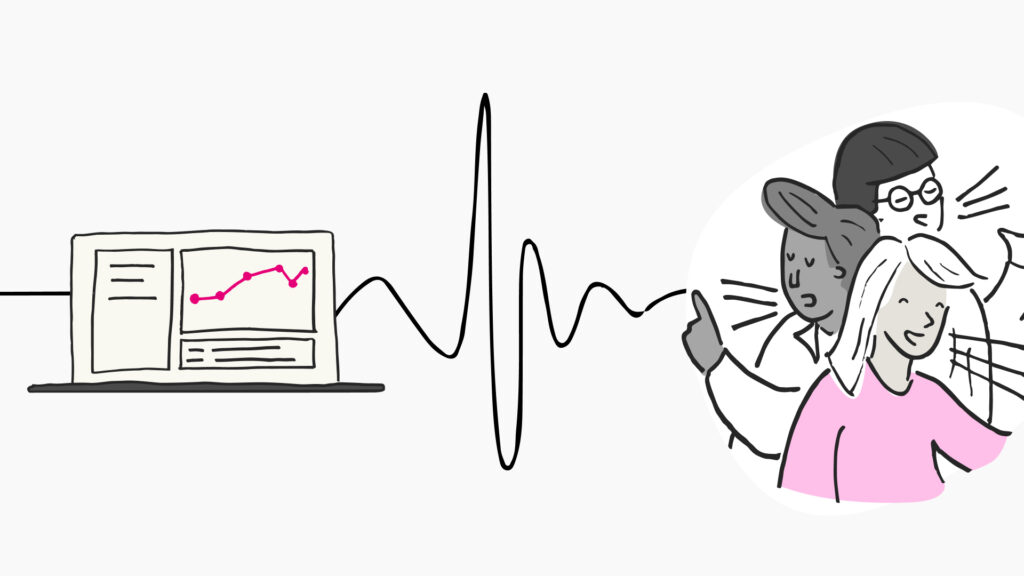
There can be many reasons for fluctuations in organic traffic to your website. Within this guide we will aim to give you some ways to diagnose the problem as well as recover traffic. We will also let you know when it’s time to call the experts in.
‘Why is my organic traffic down?’ is a common question that prompts businesses to have a conversation with us. Organic traffic may decrease due to algorithmic updates, technical issues, poor on-page optimisation, loosing high-quality backlinks, competitor changes, low-quality/duplicate content, or penalties.
There are some common misconceptions in why this happens such as algorithm changes and Google penalties. Following Google’s best practices will reduce the risk of your website being affected by algorithm changes or penalties.
However, if you have been given advice to pay for links to your website, or if you have created content that is so stuffed with keywords it is unreadable, it can flare up red flags to Google. This because it tells Google that you’ve been implementing bad SEO practices also known as ‘Black Hat SEO’.
It is possible to recover from both these issues, but you will need to speak to an SEO expert first. But if you’ve been on your best SEO behaviour, your low organic traffic could be caused by something else. But don’t worry – read on and we’ll show you what you can do.
Have you checked that your analytics system is reporting correctly?
Before diagnosing the reason behind your traffic loss, it’s important to double check that the system you are using to measure users on your website is reporting correctly. A drop in traffic sudden or slowly, could be because changes have been made to how users are being tracked that is resulting in lower numbers.
Before making any changes to your website or strategy it’s imperative that you have trustworthy data to make those decisions with. If your data is untrustworthy, and you need to adjust your set-up, you should wait to see some trustworthy data before making any changes.

Why is my organic traffic down?
It’s important to understand the speed at which the traffic has declined. Has your traffic dropped off a cliff overnight or has it been a steady decline over a period of months?
If your organic traffic has declined slowly, this is a sign that you need to invest in your SEO strategy. Search engines place high value on a well-constructed website with fresh engaging content, that is regularly updated.
If your traffic has vanished overnight this is a symptom of a bigger problem. It is an indication that search engines no longer understands your website set-up. If you believe this has happened to you then you ask an SEO expert for a Technical SEO Audit.
This will be a comprehensive audit of your website’s:
- crawlability
- performance
- internal linking structure
By reviewing the results of the audit, you should be able to understand any structural problems with your website.
Common causes for organic traffic dropping
1. Technical website issues
Technical issues can affect your website’s performance and lead to a drop in organic traffic. Check if your website has any crawl errors, broken links, or slow page load times.
If you are experiencing these types of issues with your website, there’s a good chance that users and search engines are having problems too. Search engines measure and understand patterns of behaviour on your website.
If they detect poor engagement with your website because of technical issues, they will decrease the visibility of your content in search engines. This is because they are looking to serve their users with the best experience possible from their results (learn more about the relationship between UX and SEO in our blog).
2. Underperforming or old content
A slow decline in traffic to your website could be a result of stagnant or poor performing content. As a rule of thumb, you should be posting fresh content on your website at least once a week.
This will create a library that search engines can use to connect you with your audience. Without content on your website search engines will struggle to understand your business proposition. Creating a barrier for them to connect you with prospective customers.
3. Your Domain Authority has dropped
Backlinks are an important part of your SEO strategy, and you should audit them regularly as well as outreach for new links. It is possible that you have made changes to your content and lost some high value backlinks, dropping your overall Domain Authority.
Google will naturally ignore spammy links, so focus on lost high authority links, and develop a plan to reach out with alternative content to win back the link.
4. Your competitors have invested in SEO
Another reason for a slow loss of traffic to your website, is that your users are going elsewhere. If your competitors are implementing an aggressive SEO strategy, they could be stealing your market share of the users.
Using SEO tools such as SEMrush you can see the traffic patterns of your competitor websites and understand if they have big increase in website traffic.
5. Check for an algorithm update
Google regularly tweaks and updates its algorithm, which can lead to fluctuations in search rankings. If you don’t engage in bad SEO practices, it is unlikely that this will be permanent.
But it is important to stay on top of updates, and regularly review your website against Google’s Guidelines. You can use tools like MozCast or SEMrush Sensor to track these algorithmic updates.
6. Check for penalties
In a worst-case scenario search engines can penalise websites for violating their guidelines. To check if your website has you will need to log into Webmaster tools and follow Google’s guide.
Unless you have been given poor SEO advice, it is highly unlikely that you will be hit with a Google Penalty.

Five quick fixes for when your website is not getting enough traffic
We’ve discussed the reasons for a drop in organic traffic, but here are some things you can do to recover your traffic. There are no silver bullets in SEO, and the best option is to work with an SEO professional. However, there are some actions that will benefit all websites.
These are:
- Make sure your sitemap.xml file is up to date with all the content on your website.
- Use Google Trends to understand what people are looking for on the internet. It can provide valuable insights for fresh new content for your website. Turn these insights into a regular blogging calendar for an extra boost to your traffic.
- Make sure all the internal links on your website are working. One of the biggest barriers for search engines to find your content, is that they crawl your website through all the internal links of your site. If any of those links are broken not only prevents search engines from finding all the content on your website, but your users too!
- Ensure that all your pages have Titles and Meta Descriptions that explain what your content is about and entices people to read it. This can increase your click through rates from search engines as well as make your page stand out.
- Think of ways you can earn links from other websites. This could be as simple as creating content to contribute to an industry blog. Or you could create a useful tool for your industry, held within an iframe, that people can use on their websites.
We hope this guide has demystified some of the misunderstanding around search engine optimisation and given you an understanding of the causes and effects to your traffic drop.
If you are still struggling to understand the traffic fluctuations to your website, we are here to help. Our talented SEO team are always on hand for a casual chat.
We drive commercial value for our clients by creating experiences that engage and delight the people they touch.
Email us:
hello@nomensa.com
Call us:
+44 (0) 117 929 7333




